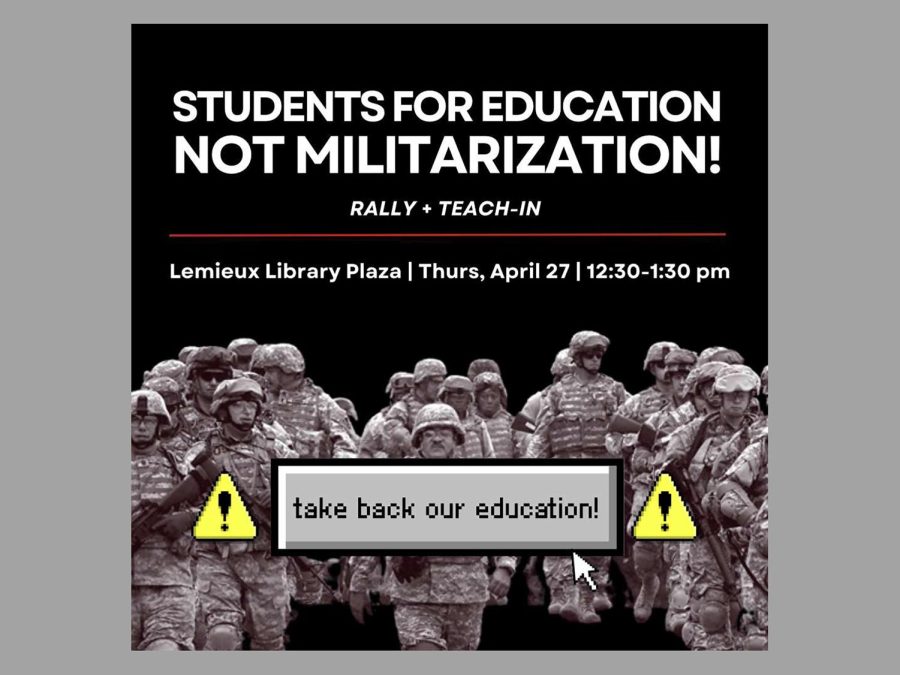Seattle U Students Call For Action Against Militarization
Students from Seattle University and the University of Washington (UW) united to lead demonstrations for the National Day of Action April 27. Students protested against the Enhanced Defense Cooperation Agreement (EDCA) established in 2014 along with other trade agendas that advocates argue situate Filipino youth in states of hardship.
Patrisha Visaya is a second-year student at UW, and a member of the Kabataan Alliance, which is a national alliance group for Filipino youth and students. Visaya, one of the students who organized the event, gave insight into how militarization efforts impact communities locally and internationally. She spoke about how the U.S.’ relationship with EDCA has a negative impact upon marginalized communities including Filipino youth.
“Essentially, what EDCA is, it opens the United States military to enter the Philippines, and what makes that possible is the money from our tax dollars here in the United States,” Visaya said.
Visaya argued that tax dollars could go to a cause that invests in youth rather than disenfranchising them, and spoke on the importance of campaigning for Filipino youth advocacy in King County.
“In Seattle Public Schools there is a Filipino U.S. history class that was implemented in October that is threatened to be cut along with other ethnic studies classes. Ethnic studies shouldn’t have to be fighting against each other to have a budget. This is something that should be given and not asked,” Visaya said.
Visaya discussed The Asia Pacific Economic Cooperation (APEC) forum and how it affects Filipino youth. Advocates argue that APEC is imperialistic and is focused on the financial benefit of the few at the expense of the community.
“APEC’s main objective is to facilitate regional economic growth, but how we see it is that leaders of different countries prioritize profit at the expense of its people. How that relates to education, countries including the Philippines are aligning the curriculum for students to be introduced to cheap labor. Education is one of the many things that are affected,” Visaya said.
Visaya elaborated on how she believes U.S. government-introduced commercial interests influence communities and institutions locally.
“Locally, Boeing is one of the largest institutions that are investing in STEM education at UW where students are used to taking part in war machines. Education should be pro-people. What we’re seeing is the competition to serve these big corporations,” Visaya said.
Jacob Caddali, a first-year political science major at Seattle U, helped organize the demonstrations calling for action against EDCA and the Baliatan war exercises. Caddali was inspired to lead demonstrations after learning about Filipino history and labor activism.
“This year in Seattle, I began to hear and learn from other Filipino activists across the country and learn more about the history of the Philippines. Learning about student protests that had stopped dictatorships and brought a change in the Philippines, that led me to learn more about war games and U.S. militarization. I wanted to bring more awareness to the campus community and political engagement,” Caddali said.
Caddali spoke about how the lasting continuance of imperialism still dominates countries such as the Philippines.
“Thousands of U.S. and Australian troops are coming to the Philippines to train the Philippine military.The Philippine military is used by the fascist government to commit human rights abuses,” Caddali said. “[The EDCA] granted the U.S. a lot of power with access to military bases. These types of military agreements happen everywhere across the globe.”
Mariam Gohar, a first-year political science and international studies double major, attended the event and spoke about the importance of revealing the problems imperialism and militarization produce for marginalized populations.
“I was there to support and uplift the cause. I think all the struggles related to militarization and imperialism are connected,” Gohar said.
She also spoke about the importance of allyship and for students to be proactive in the pursuit of social change.
“You don’t necessarily have to identify with those identities to get involved. I’m not Filipino, but I am still supporting the cause. It does not matter what your background is–there is always a need to step up and advocate. We need to use our privilege and circumstances here to help others around the world. There are a bunch of organizations that you can easily find on Instagram—I would say the activism space is pretty accessible,” Gohar said.
Nikhil is an employee of the Department of Health at UW. He was inspired to lead and organize events after becoming interested in the detrimental impacts of colonization on a global scale.
“I moved to Seattle in 2021 during the pandemic, and like many, I was overwhelmed and exhausted by continued violence from the police in this country as well as armed forces around the world, especially with the U.S.-Israeli colonization of Palestine. My feelings transformed for this intense time. Like many, I thought of this violence as senseless, and I felt disempowered by it,” Nikhil said.
Nikhil began a journey of activism within his community.
“In attending rallies and educational events, I learned about the forces that cause fascism, police violence and U.S. militarism. I learned that they are linked, not censored. They are motivated by economic systems within a ruling class. Joining in the resistance, I felt compelled to organize and lead,” Nikhil said.
Student advocates at UW and Seattle U continue to organize against what they allege is an apathetic view toward international human rights issues on their college campuses, while prominent Seattle businesses who contract with the U.S. military work to capitalize on the pool of recent college graduates in the Emerald City.











